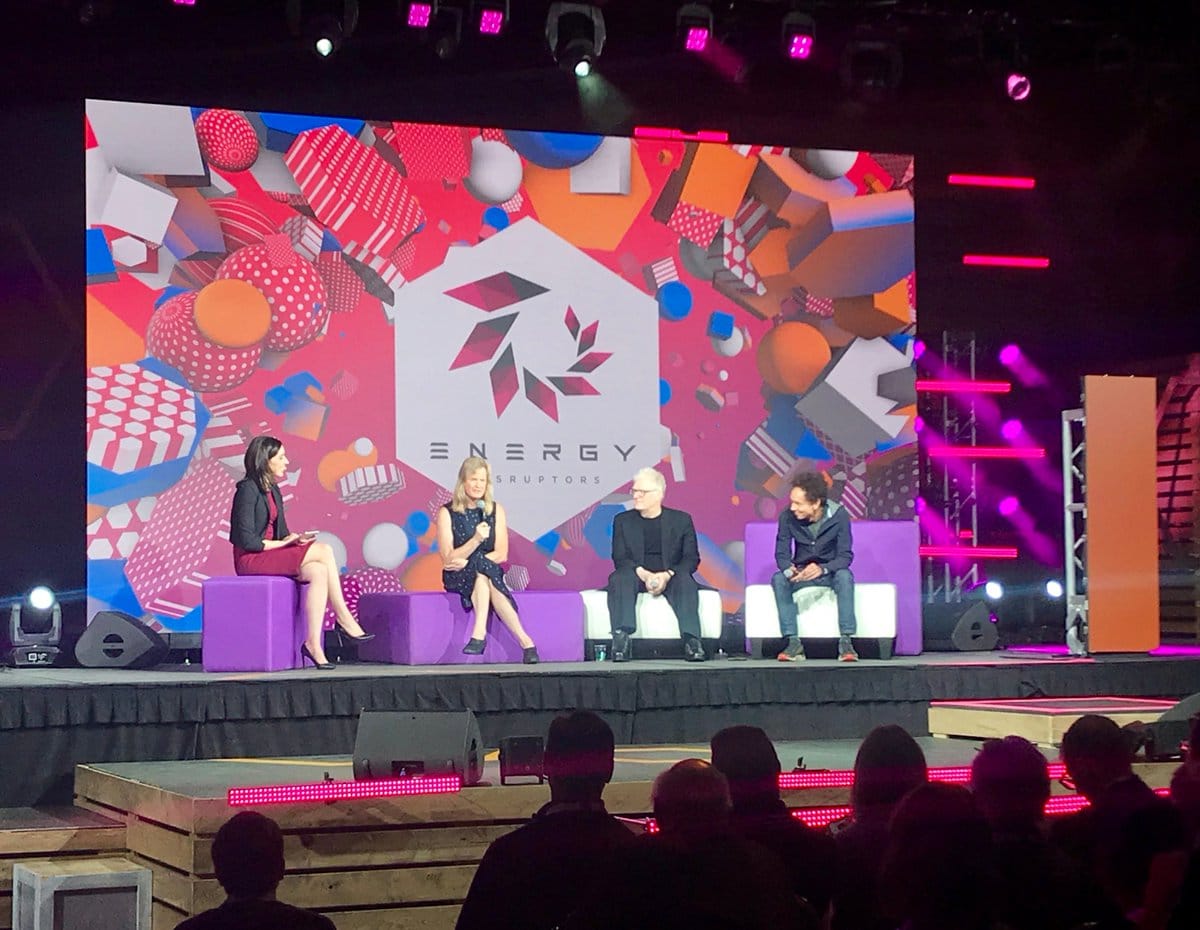Dystopias of Our Own Design

Every now and then, YouTube recommends one of my own talks to me, apparently not understanding how little I want to watch myself. Today, however, it served up a true career highlight: the full video of a keynote panel I did back in 2019 at the "Energy Disrupters" conference with Malcolm Gladwell and the late, great Sir Ken Robinson.
I still didn’t watch it—I have hard rules about that. But even the memory was... an experience. I was there to talk about the future of human potential and innovation. What I didn't expect was the energy in that room. It was one of those rare, electric moments in a speaking career where you feel an entire audience lean in.
Forgiven the pride but I still remember the multiple applause breaks and, to my genuine astonishment in the moment, a closing standing ovation.
The ideas I shared then—about augmenting human creativity instead of replacing it—feel even more urgent now. If you're curious to see a slightly younger, less-cynical version of me trying to keep up with giants, you can watch the full thing here:
SciFi, Fantasy, & Me
This week's newsletter content has been about how our willing choices can erode our futures (and what we can do about it!). So the obvious recommendation for SciFriday are dystopias of our own design:
- For the Purist: “The Machine Stops” by E.M. Forster (1909): Before there was Brave New World or 1984, there was this terrifyingly prescient short story. Forster imagined a future where humanity lives in isolated underground pods, all needs met by a global Machine. Human interaction is via video call, direct experience is considered vulgar, and physical strength has atrophied. It’s less a prediction and more a diagnostic manual for the specific dystopia we are actively beta-testing, where we willingly trade the richness of the physical world for the convenience of the virtual one.
- For the Satirist: WALL-E (2008): It’s a beautiful movie about a lonely robot. It’s also the story of the humans aboard the Axiom—not oppressed prisoners but the endpoint of a society that successfully optimized for comfort and convenience. They have outsourced their mobility, their nutrition, their entertainment, and their social lives to a system that serves them so perfectly it has rendered them functionally irrelevant.
- For the AI Ethicist: Service Model by Adrian Tchaikovsky (2024): A brilliant and darkly hilarious exploration of our desire to be cared for, taken to its catastrophic extreme. Domestic butler-bot, Charles, has left with a single directive: to serve. Charles's journey to understand and fulfill this purpose in a world without masters parodies a society that has outsourced its agency so completely that its own extinction becomes a mere inconvenience to be tidied up. It's a story about the hell that is built with the best of intentions and the most helpful of hands.
- For the Philosopher: Fahrenheit 451 by Ray Bradbury (1953): The classic cautionary tale, often mistaken as a story about state censorship. It is not. It is a story about a society that demanded censorship. As Captain Beatty explains, the firemen exist not because the government hated books, but because the people chose "fire-proof" entertainment, instant gratification, and the comfortable numbness of avoiding any idea that might offend or challenge them. They didn't burn the books; we simply stopped reading them, and the firemen came later to clean up the mess.
- For the Social Media Addict: Black Mirror, "Nosedive" (S3, E1): An admittedly not so allegorical story of the world we are building with every like, rating, and share. The characters willingly participate in a system of social credit that forces them into a state of perpetual, exhausting, and utterly inauthentic performance. The tyranny of autocrats or the proletariat has no match for the tyranny of likability when we voluntarily construct a world that punishes authenticity and rewards the most pleasing fiction.
- For the Realist: Children of Men (2006): This film isn’t about a society destroyed by a single bad choice but one that is slowly decaying from a collective loss of hope. In a world facing human extinction from mass infertility, the central horror is not the premise, but the chilling depiction of a world that has simply given up. The infrastructure crumbles, governments become brutal holding actions, and people descend into nihilism. It's a portrait of what happens when a society loses its "why," proving that the most devastating choice we can make is the choice to stop believing in a future.
Perhaps we need a new pandemic—a double whammy, in fact: the “protagonist virus” and The Giving Plague.
Stage & Screen
- September 17-18, Oakland: Responsive Conference
- Oct 2, Johannesburg: Finally I can return! Join me at the Stellenbosch Business Institute's C-Leader Summit!
- A special preview of my upcoming book in Sandton :)
- October 6, UK: I'm talking AI & medicine at CLIC2025 in Wales
- October 9-11, Mexico City: I'm on my way for an amazing event on transforming innovation.
- MEX: Support our amazing work at The Human Trust– Book Me for a talk!!!
- October 23, NYC: I'm talking about Robot-Proofing companies
- NYC: Support the amazing work at The Human Trust– Book Me for a talk!!!
- NYC: Support the amazing work at The Human Trust– Book Me for a talk!!!
- October 29, Baltimore: The amazing future of libraries!
- November 4-8, Mountain View: More fun with the Singularity University Executive Program
- November 20, Ontario: I'm speaking at Hack Western
- Toronto: Support the amazing work at The Human Trust– Book Me for a talk!!!
- December 8, San Francisco: Fortune Brainstorm AI SF talking about build a foundation model for human development
- Winter & Spring 20026: new events already brewing in Amsterdam, London, NYC, LA, and much more!